News for 12 January 2021
All the news for Tuesday 12 January 2021
Savita & Co await for the first match against Argentina on Sunday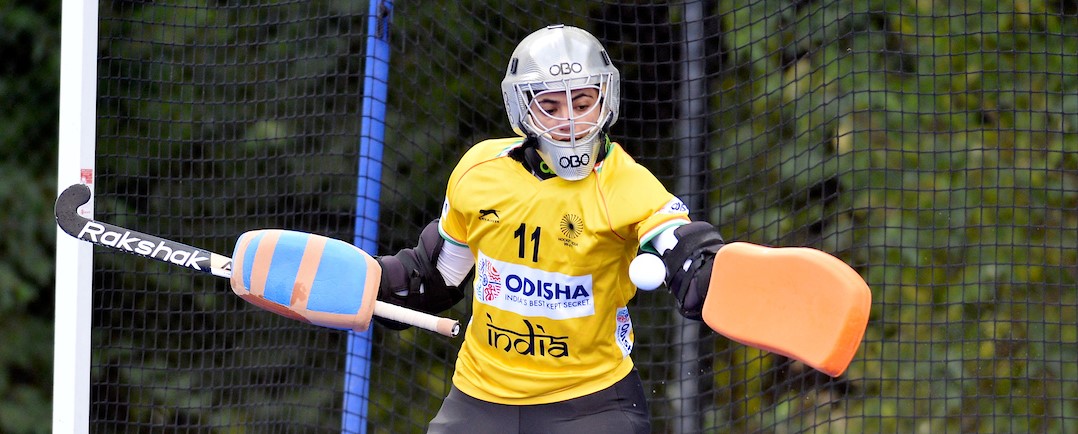
“We are absolutely looking forward to our first match on Sunday against the Argentina Junior Women team. Before that, we will be getting four good sessions of hockey here where we will focus getting match-ready. We will be looking at getting used to the pitch and playing in hot conditions. The weather here is quite hot and humid,” says Indian team captain Savita.
Indian team of 25 players have landed Argentina a week ago. The Indian Team will be playing their first competitive hockey match after nearly a year.
Upon arrival in Buenos Aires, a city which hosted the Youth Olympic Games in 2018, the Indian team focused on recovery and conditioning all of last week.
“It was quite a long travel for us with one stopover in Paris. The total flying time was nearly 23 hours. So, the Coaching Staff ensured we got enough rest before we had our first hockey session on 7th January. In the first few days upon arrival, we just did some stretching inside the hotel itself and did some conditioning work. Since we were coming back into training after 3-week break, we did not rush into playing hockey,” she stated.
Having trained well and achieving desirable fitness goals in their previous National Coaching Camp in SAI Centre Bangalore between August and December last year, the team is confident of a good show in Argentina.
“All the players are looking forward to the matches. Though we have not competed in the past one year due to Covid-19 restricting our tours, we have achieved match-fitness. We have not played Argentina in the recent past and we are confident of a good show,” stated the Vice Skipper.
Stick2Hockey.com
Tumilty and Irish men on tenterhooks over allocation of World Cup qualifier places
Irish coach Mark Tumilty.
Irish men’s Mark Tumilty is waiting on tenterhooks for clarification over the men’s 2023 World Cup qualification process, admitting it could have an effect on whether some senior players continue or not.
The FIH announced in December that all qualification places would be via the continental championships with Europe allocated seven men’s and six women’s tickets of the 16 available at each tournament.
Brought on by Covid, it is a big change from the previously announced format which was set to see six places available from the various continental championships with the remaining places decided by worldwide home and away playoff contests like the 2020 Olympic qualifiers.
How exactly those spots get divvied out remains to confirmed with the FIH stating solely: “teams will qualify based on their performance at the final competition of each 2021 Continental Championship”.
It has left numerous federations across the Europe seeking clarification over exactly how those places will be determined, particularly whether only the “A division” is relevant in this context.
It that is the case, it would mean Ireland’s men – following their 2019 Euro relegation – would be out of contention already along with all the other countries in the second tier in 2021.
However, requests are in to ask if the EHF can decide their own format or potentially offer a ticket or two to the B division, opening up the qualification process to more countries.
It is a frustrating situation for Tumilty, particularly after nearly 15 months with no international fixtures and none confirmed on the horizon.
“There should be an opportunity to qualify for a World Cup; it can’t be based on how a team did back in 2019, from a tournament no one had any idea would have any bearing on four years’ time,” he told the Hook.
“The qualification process from the FIH, to me, is a complete and utter shambles. There will be some guys who were 24 then and could be into their 30s for the next World Cup which is madness.
“I have seen three different qualification processes in relation to the World Cup. It was going to be home and away games, like the Olympic qualifier. Then it was changed to a 12-team tournament with five teams qualifying. Now we have ended up with what the FIH have come up with.
“We can use Covid as an excuse, but the Olympics is always chopped and changed and the World Cups have chopped and changed. We had the World League then the Hockey Series.
“A couple of senior guys had taken a break in 2020 which was the right thing for them; they’re all keen to come back in. At that stage, I’m probably honest about it, there’s probably a few who may make a decision as to what their long term career future international career looks like, depending on the World Cup qualification ruling from the EHF and FIH.”
Tumilty’s panel is currently on a rest period, fortuitously side-stepping a proposed warm-weather trip to South Africa this month. That tournament was also due to feature India, Britain and Belgium but was pulled five days before tip off, meaning Hockey Ireland avoided incurring costly cancelation fees.
But, otherwise, it has been a bit of a luckless tenure for the Banbridge man between the Tokyo qualifier against Canada and the blank year in 2020.
Behind closed doors, he has expanded his panel with plenty of young blood who he has been excited to see at close quarters.
But the development of that talent will need some international fixtures, something that just isn’t possible to plan for the time-being. There are potential invites to the Sultan Azlan Shah Cup and Four Nation tournaments in Spain among other things but nothing that can be confirmed yet.
“I was pleased with the progress we made in 2020 with squad games and the regional sessions. We will look to continue that during January, February, March.
“It has given more players exposure to training more often and exposure to playing with the better players in the country which is important to grow the number of international hockey players that we have on the path to the senior international team.
“Like everybody, we can’t commit to anything, and the other countries can’t commit to anything definite. Hopefully by the end of quarter one here, we should be able to confirm.
“It is disappointing not to give the younger guys exposure to international hockey, because I think that’s important, to see what level they’re at, to give him a bit of encouragement as well.
“But to be fair, the commitment from the players, young and old, has been excellent. I can’t speak highly enough of how hard the group have worked and their attitude. If that’s maintained, I can be very positive and how we can move forward.”
The Hook
Ireland coach lambasts Hockey World Cup qualifying process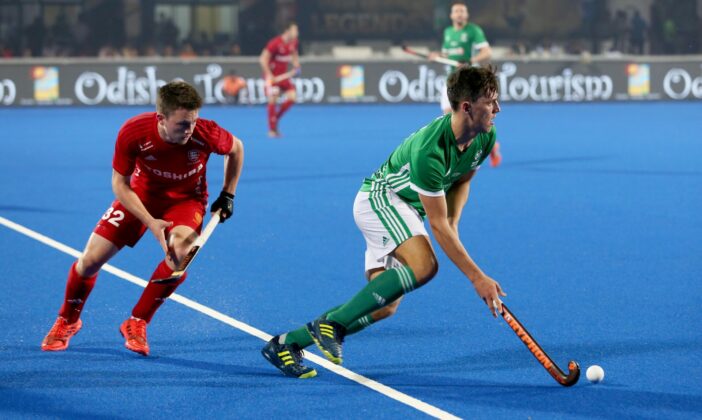
Ireland men played at the 2018 World Cup
A “complete and utter shambles” is how Ireland men’s coach Mark Tumilty views the current qualification process for the next Hockey World Cup.
Speaking to the Irish Examiner, Tumility says it will now be increasingly difficult for the Green Machine to make the 2023 World Cup.
Last month, the FIH increased the number of World Cup quota places available through Continental Championships and Tumilty is now calling for consistency after qualifying route changes.
Europe was awarded seven men’s World Cup berths for the 2023 global showpiece event, with six representatives at the 2022 Women’s World Cup, co-hosts Spain and Holland having already been confirmed. The final four tickets will be realised at the 2021 Euros in Amsterdam this summer.
But with Ireland relegated from the 2019 Euro men’s top division, Tumilty says that a lack of a standard qualification process has left little clarity for the Irish team’s four-year cycle.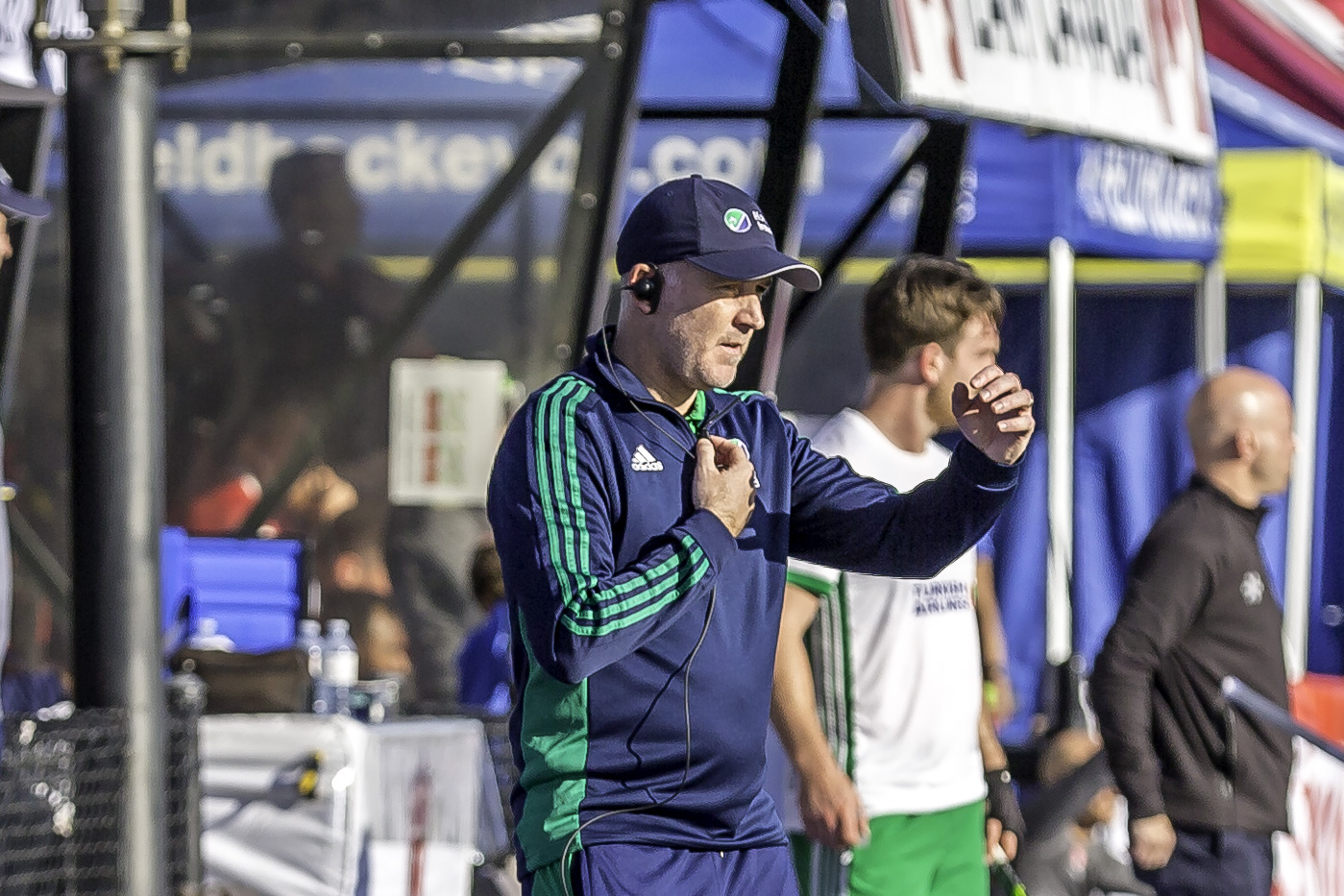
“I have seen three different qualification processes in relation to the World Cup. It was going to be home and away games, like the Olympic qualifier,” he told the Irish Examiner newspaper.
“Then it was changed to a 12-team tournament with five teams qualifying. Now we have ended up with what the FIH have come up with.”
According to the newspaper, the European Hockey Federation is mulling a regional qualifier so that countries outside of the EuroHockey Division A tournament could qualify for the World Cup.
He added: “There should be an opportunity to qualify for a World Cup; it can’t be based on how a team did back in 2019, from a tournament no one had any idea would have any bearing on four years’ time.”
Meanwhile, Ireland women became one of the first international teams to play some sort of competitive hockey when the Green Army played against Spain at the weekend. Ireland won 4-1 in Murcia in their opening non-capped set of matches.
SIGN UP for The Hockey Paper’s returning newsletter: Promotions, exclusives and our best coverage
Performance exemption approved for Scotland senior squads
An exemption, subject to strict safety standards, has been given to our senior Scotland squads and will allow them to prepare for major tournaments this year.
Scotland’s home-based performance athletes will return to training, as both our senior international teams begin their preparation phase for EHF European championships this summer.
The players are able to resume training under the exemption granted to professional and high performance sport by the Scottish Government.
Under Scottish Government exemptions the recent guidance is not applicable to professional or performance sports activity, which is approved through the ‘Resumption of Performance Sport’ process by Scottish Government or sportscotland.
While initially only Scotland senior training has been approved, we will continue to liaise with sportscotland on the potential to train for other EHF events during the year, should this be possible.
An extensive risk assessment has been carried out to allow the squads to train. This process ensures that every possible precaution is taken to mitigate the potential spread of Coronavirus both within and out-with the training environment.
Both programmes will be training at Peffermill, with the women’s programme commencing this evening and the men’s programme starting next week on a regionalised basis.
Scottish Hockey’s Head of Performance Andy Tennant said, “We are thankful to both the sportscotland Institute of Sport and the University of Edinburgh for assisting us in getting our performance athletes back on the pitch. The clock is ticking in terms of us ensuring we give our teams a fighting chance to fulfil their potential in this summer’s Euros – and getting our players back training is an essential first step.
“The University of Edinburgh has been an outstanding performance partner and we are delighted to be able to centre our training at Peffermill for the foreseeable future.”
Scottish Hockey Union media release
Hockey team camp to be announced after AHF meeting: Manzoor Jr
LAHORE: Manzoor Junior, chairman selection committee of the Pakistan national hockey team, has said that the camp of the team will be announced in the light of the decisions taken at the meeting of the Asian Hockey Federation (AHF).
Manzoor, while reviewing the matches played by Rana Zaheer Hockey Academy, said that keeping in view the decisions to be taken at the meeting of the AHF on January 15, the PHF will announce the camp of the senior team.
He said that due to COVID-19, hockey competitions in Pakistan and other countries are almost non-existent.
The News International
Bruce Collins QC to head Review Panel
Hockey Australia (HA) is pleased to announce that the independent review into the National Women’s High Performance Program will now be headed up by Bruce Collins QC, Gabrielle Trainor AO and Moya Dodd on behalf of the Australian Sports Commission (ASC).
The role of this review is to consider and make recommendations to the Board of HA on cultural and governance matters regarding the Program. The ASC will provide operational support to the panel members.
In early December 2020, the Board of HA was made aware of claims of a toxic culture and bullying in the Program. HA immediately announced that these claims would be reviewed independently and confidentially.
As previously announced, in addition to the independent review, a special complaint process has been established with Sport Integrity Australia to receive and act on complaints concerning conduct in the Program.
“It has always been Hockey Australia’s intention that this review be robust, transparent and independent,” said HA President Melanie Woosnam.
“The establishment of a review panel led by Bruce Collins QC makes it clear that these principles are fundamental to the Board.”
Bruce Collins said “Since their gold medal successes at past Olympic Games the Australian Hockeyroos have been the standard against which other sports programs have been measured. Hockey Australia is determined to maintain the Hockeyroos’ standards in every respect and I am fortunate to have two outstanding Australians sitting together with me on this review.”
The Board of HA looks forward to receiving the report and any recommendations from the review panel in relation to the operations of the National Women’s High Performance Program.
Independent Review Panel
Chair: Bruce Collins QC
An international lawyer, a member of the Court of Arbitration for Sport and the Australian National Sports Tribunal. He has a long background in sport and in sports administration. Bruce has practised extensively in commercial law and international commercial arbitration and has presided over numerous tribunals, Government Inquiries and appeared in Royal and other Commissions of Inquiry.
Gabrielle Trainor AO
An experienced non-executive whose experience covers more than 20 years on boards in the private and public sectors. She was a recipient of an Officer of the Order of Australia in 2017, for service to community in transport and infrastructure planning and design, and as a contributor to social welfare and sporting institutions.
Moya Dodd
A partner at Gilbert + Tobin Lawyers, and a former vice-captain of Australia’s national women’s football team, the Matildas. Moya served on Asian football’s governing body for 12 years (2007-2019). Moya is a member of the International Council of Arbitration for Sport, FIFA’s Player Status Committee, and the IOC Athlete’s Entourage Commission. She is Honorary President of Women in Sports Law, Chair of Common Goal, and serves on the board of Barefoot to Boots.
Hockey Australia media release
Hockey in Morocco marches on
It is now seven years since the Moroccan Hockey Federation threw itself wholeheartedly into developing hockey across the nation in line with the ambitions outlined by the FIH at its 2014 Congress.
The Hockey Revolution was launched in 2014 in the city of Marrakesh and since then, the Royal Moroccan Hockey Federation has continued to drive the sport forwards and raise its profile in schools across the North African country.
Kamal Ghallali is President of the Royal Moroccan Hockey Federation and, with a team of committed hockey enthusiasts, he has been working tirelessly to find opportunities to get more people playing hockey from across all regions of Morocco.
So, it is with great delight that Ghallali has been able to report on a huge step forward for the sport.
“We have signed an agreement with the Royal Moroccan Federation of School Sport which gives us access to all schools in the country.
“We were convinced that sport cannot develop without going through the school system, and we have already targeted four regions, which has resulted in dozens of schools in a number of cities, introducing hockey onto the curriculum.
“Our strategy, first and foremost, was to make hockey popular in these schools within the first two years of the launch in the hope of making it a national school sport according to the strategy agreed with the School Sport Federation.”
That ambition was realised just a few days ago as the Hockey Federation signed an agreement for hockey to become a major sport in all schools in the region of Casablanca- Settat. With the agreement, hockey will become an integral part of the school sport curriculum. The agreement was signed by the Director of the National Sport School promotion and directors of many of the schools involved.
This is a step towards national recognition and the target is an ambitious one: Morocco has more than 10,822 schools, including 7,785 primary schools, 1,968 middle schools and 1,180 high schools, providing for eight million students. Ghallali will call it a total success when agreements have been signed in all regions.
In addition to the schools agreement, the Federation is also involved in a new project called Study and Sport. Ghallali explains more: “We have a project programme called Study and Sport, which gathers many athletes from different sports into one of eight central venues. Here the students are provided with accommodation, food, study and sport facilities – indoor facilites, artificial pitches, swimming pools and gym facilities. Up to 30 hockey students will attend each of eight centres, receiving a great foundation in both sport and education."
The President and his team have been assiduously pursuing the ambition that first flared in 2014. They are now seeing the results of their determination as more and more children pick up hockey sticks and learn to love the game.
FIH site
U.S. O-60 Women's Masters Team Challenge Each Other in Cape Town by New Year
By Loretta DiPietro, U.S. O-60 Women's Masters Team Athlete
With the postponement of the 2020 World Masters Hockey World Cup competition in Cape Town, South Africa due to the coronavirus (COVID-19) pandemic, the members of the U.S. O-60 Women’s Masters Team needed to redirect their disappointment and energy.
In addition to completing various on-line trainings, virtual fitness challenges and community service, the team wanted something bigger to strive for - something that would get them to Cape Town - figuratively. Thus, team member Lorraine Lewis (Bethesda, Md.) formulated an idea while visualizing the computerized map that is attached to the back of an airplane seat and shows how close one is to their destination. Lorraine’s brainchild was massaged by team members Deb Atkins (Quarryville, Pa.) and Pam Sherry (Collegeville, Pa.) and the Cape Town by New Year’s Challenge was born.
The new challenge for the team was to run, cycle, row, walk, swim, hike or skip to Cape Town viritually between September 4 and December 31, 2020. This was no easy feat as it required “traveling” by human power 9,885 miles over 119 days! Using the platform Challenge Hound, the team embraced the charge and got to work, averaging 89 miles/day of “travel” and reporting 2,278 activity bouts to meet their goal. Like on an airplane, Challenge Hound allowed the team to map their daily progress toward Cape Town on a colorful digital map. Not only did the women's O-60 team succeed in their goal, they did so three days before the deadline!
The supreme ruler of the leaderboard each week was Debbie Wile (Lafayette Hill, Pa.), who, in total, cycled a stunning 1,316 miles; followed by Jeri Myers (Parkesburg, Pa.) (920 total miles). Of note as well, are the vertical accomplishments of Deb Atkins, who climbed or cycled a total 19,810 feet in altitude and Pam Sherry (14,039 feet). Regardless of whether one contributed 1,000 miles or 50 miles toward the Cape Town destination, it was clear that this women's O-60 team came together to stare down disappointment, work through some adversity and support each other in their collective accomplishments on and off the field.
USFHA media release
When hockey bade adieu to grass after the 1982 Bombay World Cup
39 years ago on this day, Pakistan defended its World Cup title, that too on Indian soil. The last World Cup on grass also saw many sweeping changes
ERROL D’CRUZ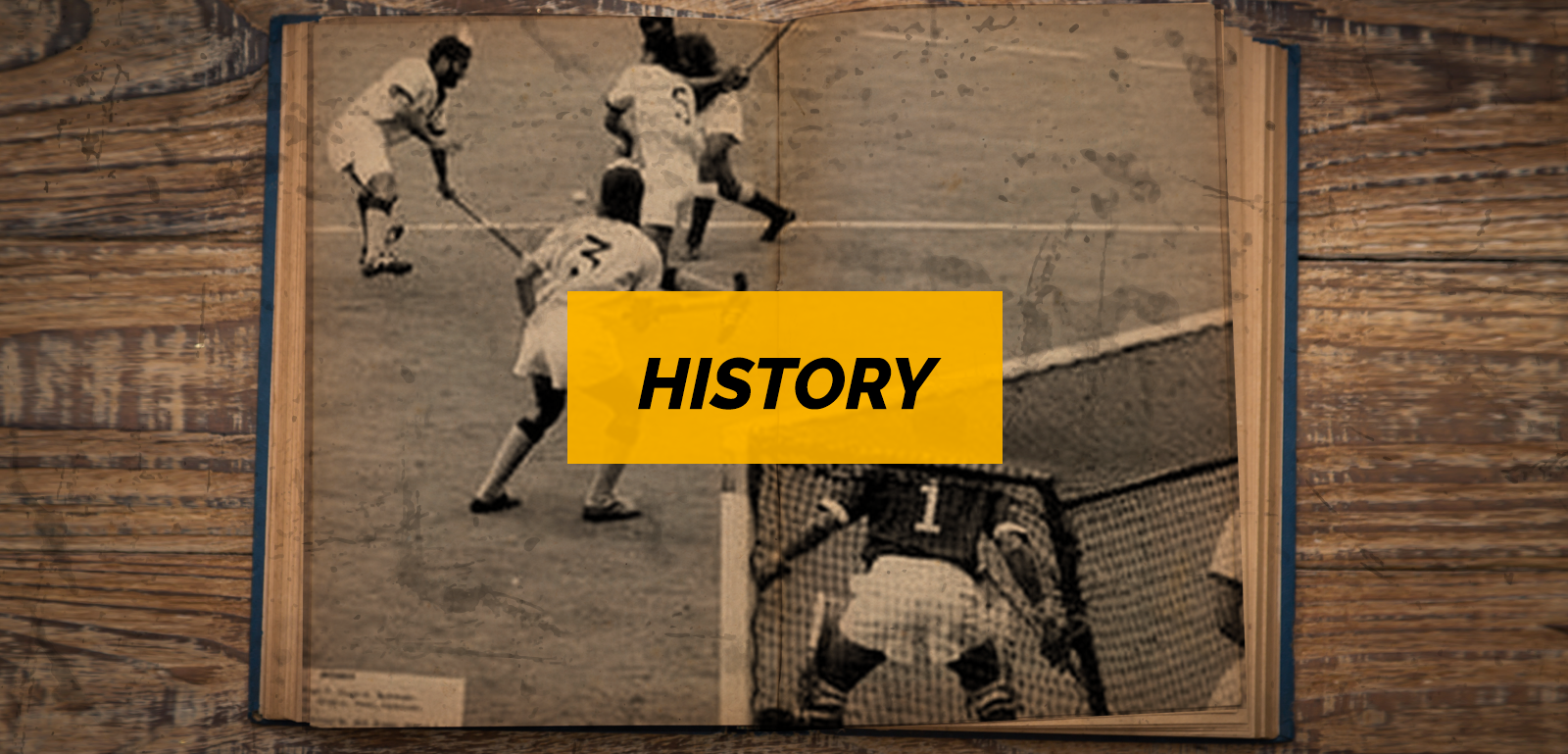
You could say that hockey endorsed tennis star Ivan Lendl’s theory that grass is for cows long before he uttered the words in 1982. The sport decided years prior that plastic was the way to go, given that hockey needs an even surface given that the ball is hard and stick skills need to be close and precise. A natural grass pitch is tough and expensive to maintain especially in colder climes where rain and snow wreaked havoc.
So it came to pass. After artificial pitches made their debut at the 1975 Pre-Olympic tournament in Montreal (and at the Games proper a year later in the same city), the 1982 Mumbai World Cup, the final of which was played on January 12, was the last global major on natural surfaces.
Pakistan, playing absolutely at home on a grass pitch, destroyed the field while storming to their third World Cup title after beating West Germany 3-1 in the final, thereby retaining the title they won four years earlier in Buenos Aires, also on lush green pitches.
After that, save an interlude or two in terms of four-nation events in the Arabian Gulf in 1986, tournaments involving the top-ranked nations took place on a variety of artificial pitches that proliferated during the 1980s.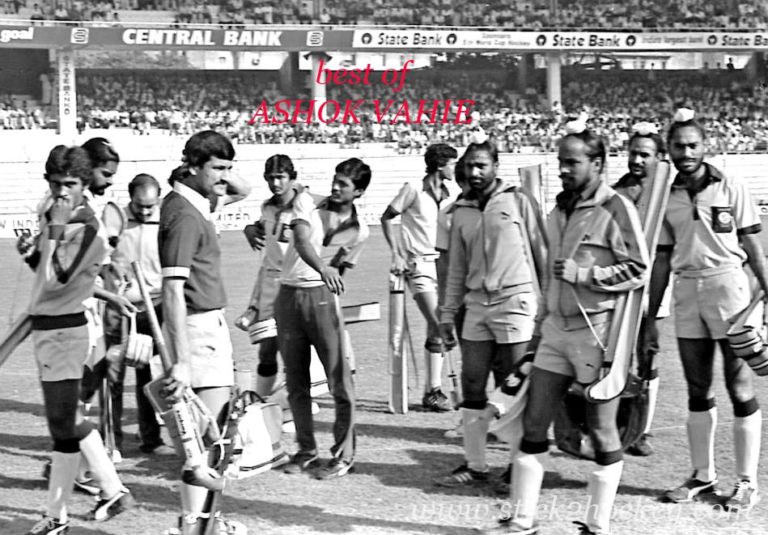
1981-1982 World Cup, Mumbai. Indian players getting ready for a match. (l-r): Md. Shahid at right extreme, behind him is captain Surjit Singh. Also seen are Mervyn Fernandis, SS Sodhi, Rajinder Singh Sr. Ravinder Pal Singh, MK Kaushik, MM Somaya, Gurmail, Onkar and MR Negi
Ironically, the 1982 World Cup introduced sweeping rule changes effected on September 1, 1981 which were to have a profound impact on the game in the artificial turf era.
The true, firm pitches of Mumbai along with the new rules helped the game take sure steps towards making a statement about its potential of becoming a spectator and television sport. But that was about it for grass. Plastic took over. So too equipment and apparel to go along. And, not least, playing styles and formations. Changes also came thick and fast in terms of tactics, apparel and protective equipment. Not to mention further rule changes as the game embraced life on artificial turf.
Pakistan’s dominant triumph emanated from their all-out attack that included the five forwards in the traditional 5-3-2 formation, not quite European teams’ cup of tea. Except for West Germany in 1972, every Olympic champion until then used the pyramid formation. But things were about to change.
India and Pakistan were to wise up to changes, albeit slowly and before the next Olympics in 1984, both Asian teams were to switch to a withdrawn forward formation.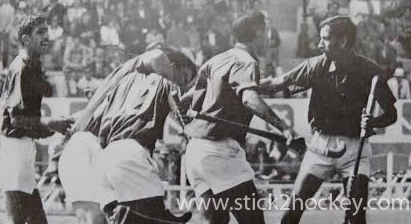
Pakistan established its supremacy over India since 1960s and it reflected in Mumbai WC too
India innovated under the iconic Balkishen Singh’s tutelage when he used Hardeep Singh as the fourth half. Pakistan were to do so under duress when their campaign went awry at the 1982 Esanda international tournament in Melbourne. When the then World Cup champions met England in the cross-over classification match, injuries forced them to withdraw a forward. The Green Shirts won the match 2-1 and left the door open to use the formation again.
The pyramid formation, however, lingered on for a while. Pakistan, who won the 1984 Olympic gold medal in Los Angeles and Great Britain who emerged supreme at Seoul 1988 largely utilised the five-forward pattern.
With the dynamics of the game changing rapidly and Europe’s return to the top top podium after a 17-year hiatus when the Dutch won the 1990 Lahore World Cup and the Germans the 1992 Barcelona Olympic gold medal, the traditional format inevitably bid adieu.
Mumbai also provided a glimpse into the future when it came to goalkeeping apparel.
Vladimir Pleshakov, the Soviet Union goalkeeper, sported a wired mask and protective equipment including enhanced padding and matched them with tactics that were seen for the first time and viewed cynically in some quarters.
He rushed out at penalty corners and lay prostrate, perpendicular to the striker to prevent a shot hitting the 18 inch backboards – mandatory for a goal to be allowed as per the rules.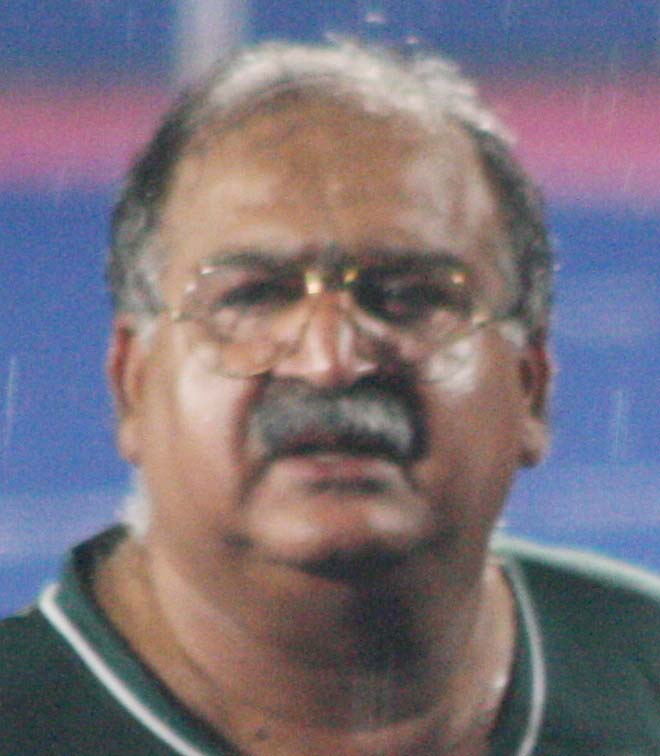
Akhtar Rasool led Pak to title in Mumbai World Cup
It was to prove controversial as some argued that such a tactic was considered against the spirit of the game. Others viewed it as dangerous to the goalkeeper and Pleshakov himself writhed in pain after stopping a full-blooded strike that hurt despite his extra padding.
The FIH rules board grappled with the situation after the Mumbai tournament, even prohibiting the goalkeeper to go down before the first shot at a penalty corner was taken. It only led to more controversy – which came first? The shot or the goalkeeper’s drop to the turf?
After much ambiguity, goalkeepers were forced to stay on their feet with high flicks being allowed as a means of scoring.
In the early 1990s, when the dreaded drag flick made its advent, lying flat on the turf at a PC became the last thing on a goalkeeper’s mind.
The Mumbai World Cup would also be remembered for sweeping rule changes that presented themselves for the first time in a global major event.
On September 1, 1981, the FIH Rules Board effected several rule changes which were used for the first time at a major tournament. Chiefly, the bully-off was abolished much to the chagrin of the traditionalists. In came the back-push from the centre spot. The bully-off more often than not resulted in a repeat and a waste of time. It was good riddance and no apologies to the purists!
Other bright changes to restart from the sidelines brought in the hit-in instead of the annoying and fastidious push-ins. Also, the long corner was modified to a free hit from the corner flag. It revealed how much ground hockey had lost over the decades to archaic rules that prolonged stoppages and came in the way of the sport enhancing its spectator appeal.
One rule, though, seemed ludicrous. The 20-stroke tie-breaker made its advent at the World Cup and was used in the semi-final between West Germany and Australia which ended 3-3 after extra-time.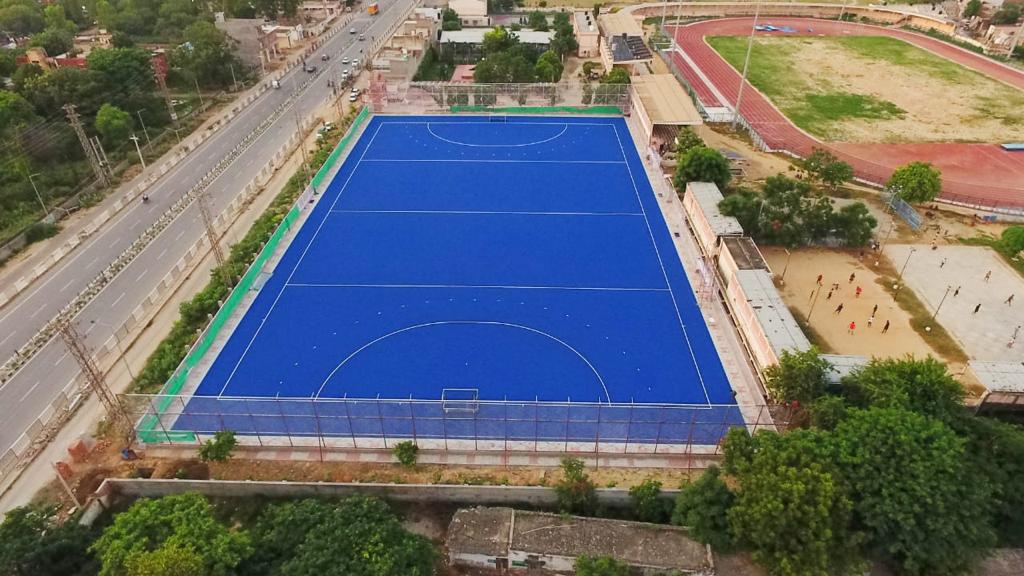
India has about 300 turf grounds for hockey
Even more ridiculous was the stipulation to continue taking penalty strokes even after Germany had achieved an unassailable lead – ostensibly to tide over a protest if any by the losing team!
The rule was dropped a few years down the line and back came the 10-stroke tie-breaker. Change surely was a constant when it came to the hockey rules and, radically, the hand stop was abolished at the penalty corner in September 1982. In 1992, offside was abolished, rolling substitutions came into being and modification to the PC routine gave birth to the drag-flicker.
By the next World Cup at Willesden, London, 1986, artificial surfaces had already become a fixture calling for changes in the material of the stick – from the tradition mulberry shaft to fibreglass and composite material.
Goalkeepers resembled astronauts with their elaborate protective apparel. For outfield players, helmets, mouth guards, gloves and, later, face masks for defenders at penalty corners became the order of the day.
The ball ceased to be leather, giving way to a plastic-rubber combine with a dimpled surface.
Significantly also, the power equations changed dramatically with traditional giants India and Pakistan contesting the wooden spoon match (won by the latter) at Willesden 1986 instead of the gold medal encounter that not so long ago seemed to be their preserve.
Stick2Hockey.com
England Hockey aims for gender parity at board level
World Cup Sideshow, Lee Valley Hockey and Tennis Centre, London, UK on 21 July 2018. Photo: Simon Parker
England Hockey is aiming to close the gender gap at board level by welcoming female applications for several recruitment openings.
The national governing body is currently recruiting for a non-executive director to join its board as well as nominations for a female vice-president.
England Hockey currently has only two female non-executive directors of the seven listed.
“We are committed to progressing towards achieving gender parity and wider diversity of our Board, which represents our membership,” England Hockey said.
“And to that end we are particularly keen to receive applications from female candidates who are able to demonstrate the relevant skills and experience.”
The board is looking for candidates who have “intellect to see the ‘big picture’” and to “be prepared to argue constructively, dispassionately and objectively.”
According to recent research conducted by Women in Sport, boards of Olympic-recognised NGBs have an average of 34 per cent women, while the professional sports club average for board positions held by women is eight per cent.
SIGN UP for The Hockey Paper’s returning newsletter: Promotions, exclusives and our best coverage
Our condolences on the loss of Fabian Gregory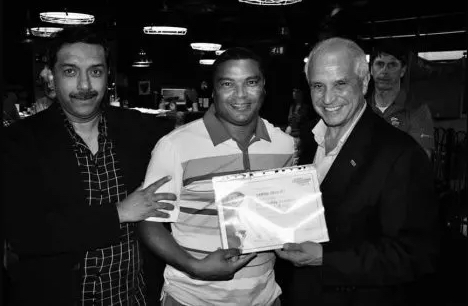
We are deeply saddened to hear of the sudden passing of Hong Kong's Men's coach and former SA Men’s Coach and former SA Women’s Assistant Coach, Fabian Gregory. Our heartfelt condolences go out to the Gregory family and friends.
Asian Hockey Federation